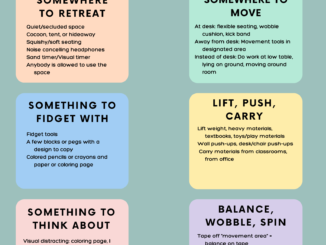This post has an audio and video recorded version for those who prefer to learn by hearing rather than by reading. Scroll to the bottom for the video of me reading it.
I have a memory from very young in my childhood, that I can’t remember whether it was all just a thought process I had in my head, or something that I expressed out loud to somebody and then they answered me about. Basically, I remember very specifically that I [either said out loud, or thought] about how, when I was “in trouble”, and expected to sit by myself somewhere and not do anything, I could simply entertain myself with my fingers by pretending they were people walking around and tell myself stories about them. Or, alternately, I could close my eyes and watch the static/“floaters” that I could see in my vision if I looked for them (I called them “the dots” at that age), and watch the dots move around. Basically, what I observed is that I could entertain myself no matter what, because the adults couldn’t take everything away from me, they couldn’t take away my hands and my eyes and my imagination.
I [either thought to myself, or was answered, and either way it became Ultimate Truth to me] that this was, of course, morally wrong of me to do. It would be morally wrong of me to be sitting and awaiting punishment, for me to feel anything other than guilt and shame and sadness and fear. It would be morally wrong of me because I had done whatever it was that I was “in trouble” about and I hadn’t yet been punished about it.
In other words, it would be morally wrong of me to regulate myself.
I was “supposed” to stay dysregulated. I was supposed to continue feeling guilt and fear and shame and sadness until someone had hurt me in some way and then I could be sad and hurt and ashamed about that, and then *after* that, *then* I could figure out how to self-regulate, because I would have paid for whatever it is I did “wrong”. Usually I would sort of be expected to co-regulate with the person who had just hurt me—emotionally or physically—which is not real co-regulation.
This whole thing felt viscerally upsetting and gross to me to even type out. It took a long time to make my fingers type it. I will probably limit the comments.
I would have called it “sin” because of evangelical Christianity, but I don’t think this is a Christian-exclusive framework. This is also the same framework that underlies needing to find a “logical consequence” for kids’ behavior because the “natural consequence” (the thing that just happened by itself) isn’t “bad” enough to make the kid regret it, or not do it again. This is the framework that underlies the whole entire adult imposition of consequences. “You have done something. You don’t seem to care or be upset enough by the results of having done that. I will make sure that you do care and are upset enough, by hurting you in some way. Don’t you dare regulate yourself before that, because then I’ll assume you’re unempathetic and don’t care. Your body coming back to baseline is a bad thing.”
I hope i don’t have to elaborately explain why “Your body coming back to baseline is a morally bad thing” is so, so, so damaging to learn as a young child.
I am not saying that you’re a horrible parent for “using consequences” with your child (what a weird phrase, though). I know everybody is trying to do their best. I know sometimes you feel desperate and like you don’t know how to get your kid to understand something that you are actually, really, objectively, truly right about and might even be for their safety or whatever.
I just don’t think this framework is the way to do it. I think the whole thing is rotten through. And replacing the word “consequence” with the word “boundary” does not fix it any more than replacing the word “punishment” with the word “consequence” fixed *that*. You have to shift the framework entirely, not just replace the words that are in it.
You hold a boundary for the boundary’s sake, not for the child’s sake. Hear what I mean by that: I don’t mean that it’s not for the child’s benefit or that everything doesn’t always come back to the child, because of course it does. I mean that if you decide, “my 18 month old can’t climb up on the coffee table, it’s not safe!” then you don’t need to set about figuring out how to teach the 18 month old not to climb on a coffee table. You hold the boundary for the boundary’s sake. You determine “an 18 month old cannot be on the coffee table” and you make that happen, as much as you would if you were planning for a force of nature or a fact of life. You remove the table, or you sit by the table and block the child, and maybe eventually they will internalise “oh, alright, this isn’t an option” and do something else — PROBABLY eventually they will do that. And even if they don’t, it’s still on you to block them. You’re blocking them because you’ve decided they needed to be blocked. You’re not blocking them because you need to teach them not to go on it, nor because you need to teach them to blindly do whatever someone larger than them tells them to do, especially not with an “or else” tacked onto the end of that.
And then they get older and more able to reason, and more able to co-regulate, and more able to self-regulate, and it becomes more complex as you have to determine bigger factors than the presence or lack of a coffee table. But I don’t think that the framework needs to change. I don’t think that you need to introduce an element back in where the child is at risk from you. Where they sit and wait for judgment and remind themselves not to feel better until they’ve been made to feel worse. That’s not the cycle I want to carry on.



